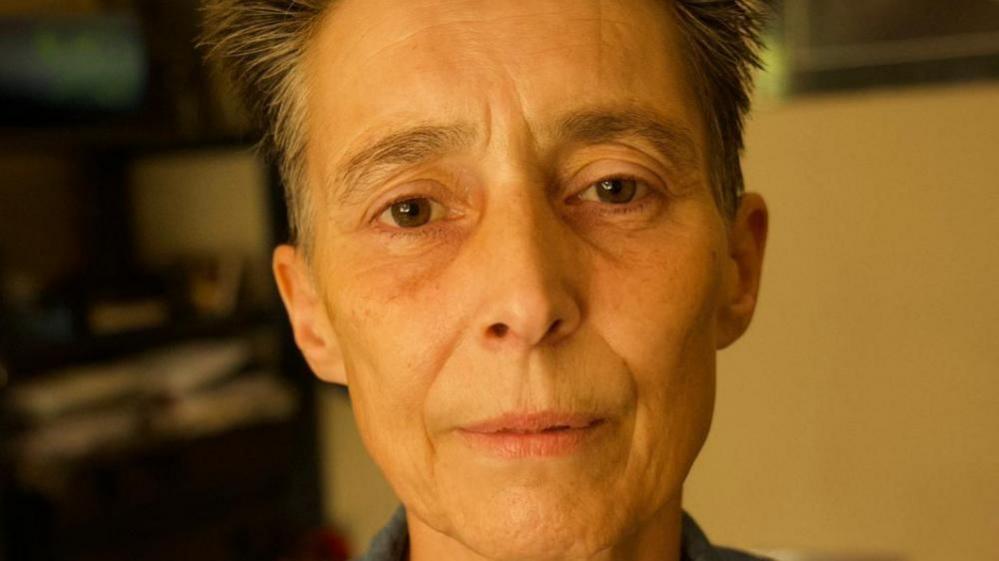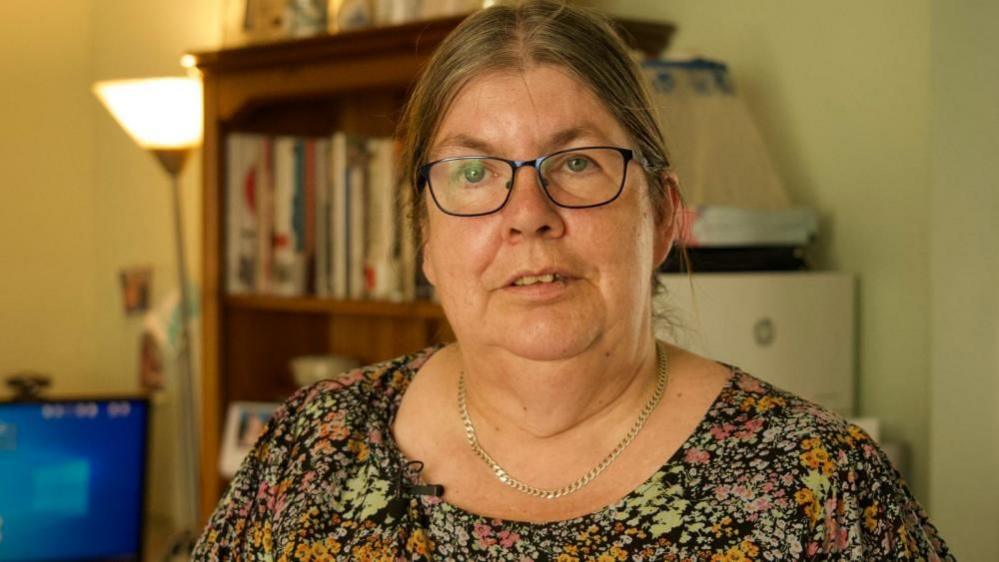ptsd
‘Just say sorry’, say forcibly adopted women
https://www.bbc.co.uk/news/articles/czdvg3y1jgeo
‘Just say sorry’, say forcibly adopted women

Fiona Irving & Jody Sabral
BBC News, South East
Cash Murphy
BBC News, South East
- Published14 July 2025
Two Kent women who were removed from their mothers when they were just weeks old and forcibly adopted say they need the government to formally apologise in order to help them recover from the trauma.
“Why can’t they just say sorry? They haven’t got the guts,” said Helen Weston from Yalding who was taken from her 15-year-old mother when she was 12 days old.
Nikki Paine, from Ashford, who was adopted at six weeks old, and was diagnosed with PTSD, says she just wants an acknowledgement of what happened to her.
A demonstration is due to take place on Wednesday to urge the government to apologise to the hundreds of people forcibly adopted during the 1950s, 1960s and 1970s as well as their mothers.
An inquiry by the human rights select committee, undertaken in 2021, looked at the experiences of children adopted across this period because their parents were either underage or not married.
Published in July 2022, its report recommended a formal apology after finding that babies were taken from mothers who did not want to let them go.
The Welsh and Scottish governments have officially apologised to those affected by forced adoptions, but the UK government so far has not.
‘Wracked with guilt’
Ms Weston said: “If we get the validation then maybe my birth mother won’t be so wracked with guilt and shame and keeping this dreadful secret.”
She was adopted in 1967 after her teenage mother was forced to give her up.
She says it has had a profound impact on her life and was diagnosed with complex PTSD.
“I’m not angry with anybody, I think that’s why I get so depressed,” she said.
“If there was one person I could be angry at, if one person was responsible, then I could give them a gob full and get rid of it.
“They genuinely thought they were doing the best for us.”

Ms Paine, who has also been diagnosed with complex PTSD, will be among those demonstrating in Westminster on Monday.
She said: “We’re all suffering from anxiety, we’re all on antidepressants.
“The apology would get the mental health support and that’s really important.”
She said: “We want this to be recognised because they took me away from my mother.
“I’m 63-years-old and it’s still affecting my life.”
‘I wanted my real mum’
Wednesday’s protest has been organised by adoptee advocate Zara Phillips, and is supported by the Movement for an Adoption Apology.
According to the group, between 1945 and 1976 an estimated 215,000 women had their children taken away from them.
A spokesperson for the group said: “We are all growing older and time is running out.
“We have been ignored by successive governments and now urgently need a public apology for this very personal and painful lifelong trauma.”
They said: “A public apology would help mothers and adoptees change the narrative around what was done to them.
“It would acknowledge the injustice and the loss which will endure for the rest of their lives.”
Some adoptees say they feel like they do not belong in their adoptive families especially when their adoptive parents have their own birth children.
Ms Weston said: “I was adopted into a family who had two children of their own, the dynamic with my adopted family was that I was always a problem child,” said Mrs Weston.
Ms Paine echoed this sentiment, saying: “I told my mother that she never hugged me, but she said you never wanted me to, and I thought how can you say that, but of course I wanted my real mum.”
The Department for Education has been approached for a comment.
Flawed
My life ended the day I was told I couldn’t stop my son’s adoption. Unless you have been a victim of forced (illegal) adoption you cannot begin to understand the profound feelings of loss. It is heart-wrenching and for me, I emotionally broke down and from that day forward I mask. I also lost my trust due to what my mother and the adoption agency did to me. To the outside world, I was fine but inside I was an emotional wreck. My friends used to joke I was an ice maiden towards men and kept them at arm’s length. I vowed I would never get married or have any more children as I was so scared that I would be forced to surrender again.
I became very lonely as I was too scared to tell anybody how I was feeling nor did I understand I was severely depressed. For too many years I was accused of being a drama queen, moody and that there were people who were far more in need of support. In the early days, the closest my mother came to showing she cared was when I received a letter from my son’s adopters. I broke down in tears and my mother hugged me tightly until I stopped crying. Even then I couldn’t talk and suffered in silence. Adoption is like an invisible amputation and every part of my body ached for and missed my son. It was another 23 years before I could start talking about my son’s adoption.
It wasn’t until more recent years that I realised that I suffer from P.T.S.D. although I have never been formally diagnosed with suffering from it. Doctors don’t seem to understand the trauma of forced adoption or make a connection. My son will be 39 years old this year and I still suffer from the trauma of losing him, sadly it will be with me for the rest of my life. I also have a history of self-harming as it was the only way to release emotional pain and I have tried overdosing over the years.
Since opening up about forced adoption I started educating people about the effect of forced adoption on mothers. It really was tough going for the first couple of years particularly when I got the courage to state that the term birth mother is offensive. I had never heard of the term until 2004 having joined up with adoption forums and groups. It is a stupid term because mothers don’t just give birth they go through nine months of pregnancy. Fathers don’t go through pregnancy or giving birth so it’s a ridiculous term to give them. It’s also stupid to give the extended family the ‘birth’ title as they can’t collectively go through pregnancy and childbirth. The real truth is it’s a term invented in America to make adopters feel better about themselves and came over to the U.K. A couple of years ago I had a disagreement with a friend at bible study as she referred to herself as a birth mother. I asked her not to as it’s offensive to mothers who have surrendered a child and why the term was created. She really didn’t ‘get it’ and used the argument that as she had had children that made her a birth mother. I explained why the term was invented but if all mothers had always been referred to as birth mothers it wouldn’t have bothered me. In the end, I got so annoyed I had to walk away from the situation. We have never talked about it since.
I am still friendly with other mothers who have surrendered babies. adoptive parents and adoptees although these days we keep in touch on Facebook. We all still learn from each other for all sorts of reasons.